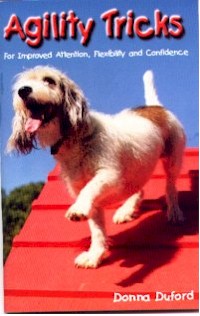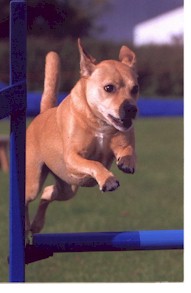For improved attention, flexibility & confidence...
by Donna Duford
Reviewed by Helen Walland
 Tricks, and
the process of teaching them, can be great tools for enhancing agility training and
performance. They encourage creativity, and because they are different, interesting, and fun,
improve attention. Tricks keep dogs on their toes, never knowing what we might ask of them.
Helen Walland reviews Donna Duford's new book. Tricks, and
the process of teaching them, can be great tools for enhancing agility training and
performance. They encourage creativity, and because they are different, interesting, and fun,
improve attention. Tricks keep dogs on their toes, never knowing what we might ask of them.
Helen Walland reviews Donna Duford's new book.
Description:
While tricks have traditionally been viewed as cute, silly, and often inconsequential to
serious trainers, the author shows us how to make tricks a useful part of our agility programs.
You can use tricks to reduce your dog's stress at shows, enhance your relationship with your
dog, increase strength and flexibility, teach your dog to tune in to you better, or simply as a
warm-up before going in the ring.
 Contents
include:- Contents
include:-
- Techniques for training – prompting, shaping,
re-enforcing and timing
- Conditioned re-enforcers
- Rewards
- Cues
- Troubleshooting
- Teaching the tricks
- Back up
- Other resources
Best features:
Donna Duford puts a great deal of emphasis on
having fun with your dog. She writes with great authority. It is easy to tell that she has
spent years around dogs. The easy to read simple format, beautifully illustrated with black and
white photos lead beginners and more advanced handlers through a thoughtful and logical
explanation of how to keep your dog’s attention at shows, through tricks. She maintains that
tricks can change a dog’s (and owner’s) emotional state before running a course.
She writes with empathy for us lesser mortals whose dogs
do not always go clear. But she gives hope that following her advice we should eventually get
that clear round rosette.
She respects the fact that different dogs learn in
different ways and gives many ideas for the reader to experiment with.
I have always envied the people whose dogs always do what
they are told but haven’t lost their sense of fun. I think they must have already encountered
what Donna Duford is writing about.
The book is American but is translated in parts for us ‘Pommies’.
It is small and I found I could easily skim it in one
sitting.
I thought that the best thing about the book was that as
I read it I thought, 'Yes, my dog and I can do this.’ And we went away and found we could! My
dog Kiri has responded very positively to the training ideas and is getting quite proficient at
many tricks which I thought were beyond her. I can tell she appreciates the extra quality time
we put in together too. I can’t wait for the agility season to put Donna Duford’s methods to
the test.
Worst features:
I found that she sometimes made reference to techniques that I didn’t understand like
‘targeting’, but it was not explained until further through the book. Generally, technical
terms are well explained.
Overall rating:
Very good. This book should be read by every beginner to agility and by anyone else who has not
yet discovered the fun they can have with their dogs doing Agility Tricks.
Price:
£7.50 including postage, USA $11.95
Value for Money:
Very good (7/10)
Design & Format:
This is a small paperback book, only 64 pages, well illustrated with black and white photos. I
found it very easy to read, with each chapter split into short sections.
|
Crosskeys Select Books
Dept. AN
Collier Row Road, Romford, Essex RM5 2BH
Tel. 020-8590 3604, Fax. 020-8599 6177
E-mail:
crosskeys@dial.pipex.com
|
 The
Author The
Author
Donna Duford owns Companion Dog Training in North Brookfield, Massachusetts,
specializing in positive reinforcement techniques for training and behaviour modification. She
serves as consultant to several rescue groups and for four years ran the exclusive dog training
programme for Tufts Veterinary School.
She lectures internationally on training techniques,
solving behaviour problems, and teaching classes, and is a favourite at dog camps. Donna is
also a nationally recognised leader in the sport of musical canine freestyle, performing and
conducting seminars throughout the country. She is owned by a PBGV and a Border Collie.
 The
Reviewer The
Reviewer
Helen Walland says that she is one of that army of 'overweight, middle-aged' women to be
seen puffing round agility courses in the West Midlands. She works with a Midi Staffie cross
called Kiri (left) who also enjoys Flyball. They are approaching their third season in
agility and are sure that this is the moment!
She is a member of Packington Agility Dog Society and has
no claims to fame in the agility world - yet.
Helen is
registered disabled, having lost about 40% of her hearing in both ears. She wear two hearing
aids but still manages - just - to teach full time in a primary school.
What Other People are Saying
From Bonnie Bartlett (USA):
Yes, I've tried the exercises in the book. My dog thinks the tricks are fun and it really helps
to keep him happy while we're waiting to go on line. I use the back up, bow, and kicks to
stretch his muscles before a run. I use spin and leg weaves to loosen him up (especially his
spine). Since I have dog that is sometimes worried about other dogs around him, I found the
exercises in Donna's book keeps his mind occupied and helps him to stay focused on ME. It
reduces a lot of stress for both of us. I love it!
From Susan McClair (USA):
It is a well written, basic book of dog tricks (roll-over,
wave, sit up, etc., etc). There are a few older books available that are much like it in this
respect, but I prefer this book.
The training methods are more up-to-date providing a
variety of options for each trick, from luring to C/T, and it describes the usefulness of
tricks in agility for warm-ups and attention. The first half is a brief and very nice overview
of the basics of dog training and some of the special situations encountered in the agility
setting for which the tricks might be useful e.g. attention at the gate, stress relief, etc.
A word of warning: The PBGV pictures are so cute you will want
to go out and buy one immediately.
If you would like to comment on
this product or add your name to the Agilitynet list of reviewers,
mail your name and details to Ellen Rocco at
Agilitynet today.
|  The
Author
The
Author The
Reviewer
The
Reviewer